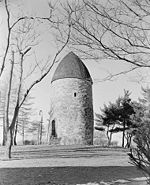 (from bigcommerce)
(from bigcommerce) Today is the 241st anniversary of the fighting at Lexington and Concord which we mark as the start of the American War for Independence. But the uprising that ended the British Crown's authority in most of the Massachusetts colony actually took place in August and September 1774. It was to reestablish Crown authority that General Gage, the British governor and military commander, sent his troops on their fateful march the night of April 18-19, 1775.
The series of blunders and miscalculations by the British leading to the Boston Tea Party of December 16, 1773 is well-told in Nicholas Bunker's book An Empire On The Edge of which THC has written. In response to this colonial outrage the British Parliament passed the Massachusetts Government Act in the spring of 1774, suspending the century old tradition of local rule in the colony overseen by a royal appointed governor. Although the closing of the port of Boston was a major economic blow the colonials considered the greater threat to liberty the granting of enormous powers to the royal governor (who was now a military officer), forbidding the holding of town meetings without permission from the governor and the power of that governor to appoint all judges, magistrates, marshals and justices of the peace.
The courts began to reopen in late summer with royal appointed officials in place of locals. In late August, 1,500 militia showed up in Great Barrington to prevent the opening of the courts in Berkshire County. Similar gatherings occurred in Springfield (Hampshire County) and Plymouth (Plymouth County). The largest, and most dramatic, incident occurred in Worcester where nearly 5,000 militia from 37 towns in the county mustered on September 6, 1774, as described in the Journal of the American Revolution:
Lining both sides of Main Street for a quarter mile, the insurgents forced two dozen court officials to walk the gauntlet, hats in hand, reciting their recantations more than thirty times each so everyone could hear. The wording was strong: the officials would cede to the will of the people and promise never to execute “the unconstitutional act of the British parliament” (the Massachusetts Government Act) that would “reduce the inhabitants … to mere arbitrary power.”
 (from allthingsliberty)
(from allthingsliberty)The Worcester confrontation was not unexpected. Ten days before, General Gage had written
“In Worcester, they keep no Terms, openly threaten Resistance by Arms, preparing them, casting Ball, and providing Powder, and threaten to attack any Troops who dare to oppose them” and vowed to send troops from Boston to keep the courts open.
By that time the 36 members of the new Governor's Council had all been forced to renounce their appointments by enraged locals or flee to Boston for protection. Those who made it to Boston, advised Gage to rethink sending British troops the forty miles to Worcester through hostile territory.
The wisdom of that advice was confirmed by the events of September 1-2. On the first, Gage sent troops to seize powder stored by local militia in the nearby town of Charleston. The colonists had
 (the Powder House, 1935)
(the Powder House, 1935)already put in place an alarm system to spread news of any British action and along with hearing of the powder seizure, false rumors quickly spread that British troops had fired on locals and inflicted casualties. Within 24 hours an estimated 20,000 militia men from Massachusetts, Rhode Island, Connecticut and southern New Hampshire were marching, with several thousand already assembled in Cambridge, across the back bay from Boston in what is known today as The Powder Alarm. When word reached them that there had not been a battle in Charleston, they dispersed back to their homes, but Gage now saw first hand the depth of opposition to royal authority. He could not risk sending a small force all the way to Worcester to protect the courts.
With the eviction of royal officials from the courts, by early October British authority in Massachusetts had collapsed outside of Boston. It was not until Gage received reinforcements and winter ended that he would undertake the Concord operation in April 1775; an operation designed to begin to reassert royal rule in Massachusetts. They would be met by the MinuteMen, special companies of the militia organized to respond immediately to any British action, established at a meeting of Patriot leaders in Worcester on September 21, 1774 after they reviewed the events of The Powder Alarm.
No comments:
Post a Comment